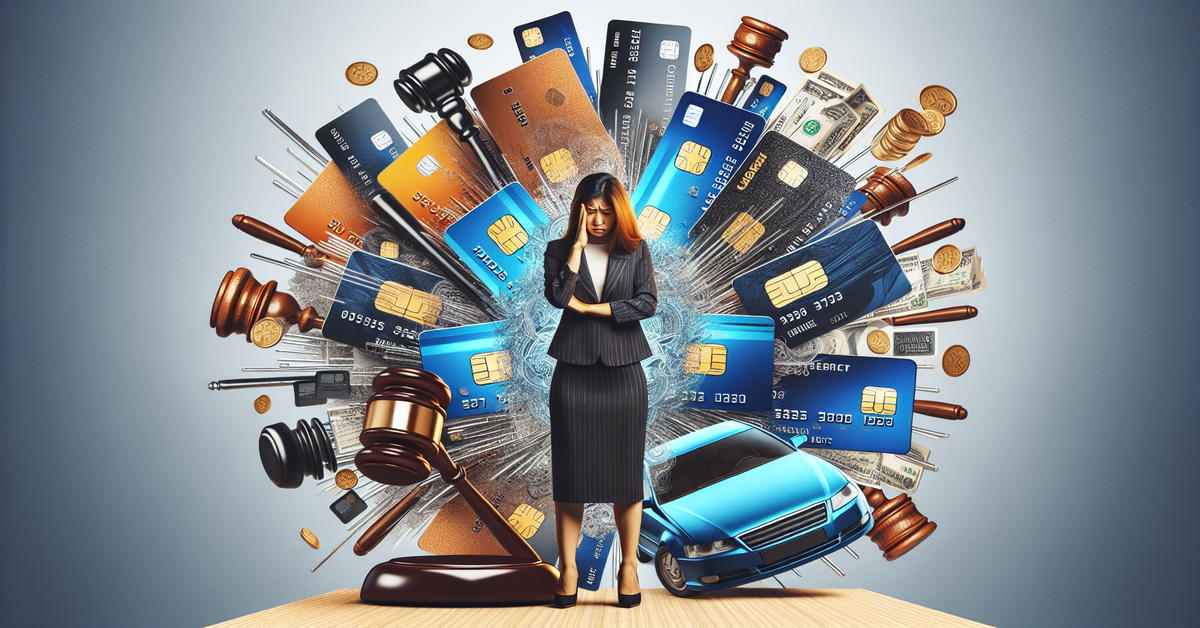If you're facing a credit card judgment, you might be wondering about the potential consequences for your car. While creditors can indeed pursue assets to satisfy debts, the specifics can vary considerably based on state laws and exemptions. It's vital to know whether your vehicle is at risk and what protections might be available to you. Understanding these factors can make a key difference in safeguarding your assets. So, what steps can you take to guarantee your car remains secure in the face of potential legal actions?
Understanding Credit Card Judgments
Understanding credit card judgments involves recognizing how they arise and the potential consequences they can have on your financial situation. A credit card judgment typically occurs when a creditor sues you for unpaid debts and wins the case in court. This legal ruling can greatly impact your credit score, making it harder to secure loans or favorable interest rates in the future. It's essential to be aware that judgments may lead to wage garnishments or bank levies, which can further strain your finances. To protect yourself, consider addressing debts proactively, negotiating payment plans, or seeking financial counseling. Staying informed about your rights and options can help you navigate this challenging situation and maintain financial stability.
How Judgments Affect Your Assets
Judgments can considerably impact your assets, including your vehicle, as creditors may seek to collect what you owe through various legal means. Understanding the potential consequences is vital for protecting your belongings. Here's what you need to know:
- Creditors can place liens on your property.
- They may garnish your wages to recover debts.
- Bank accounts might be subject to freezing or levies.
Being aware of these factors can help you take proactive steps to safeguard your assets. If you find yourself facing a judgment, consider seeking legal advice to explore options that may protect your vehicle and other essential possessions from creditors.
Legal Rights of Creditors
When a creditor secures a judgment against you, they gain specific legal rights that allow them to pursue the collection of the debt owed. This often includes the ability to garnish your wages or place liens on your property, including your car. They can also initiate bank levies, which let them seize funds directly from your accounts. It's essential to understand that these actions can occur without your consent and often with little notice. While creditors have the right to collect debts, they must adhere to legal procedures and cannot harass you or use threatening tactics. Knowing your rights can help you navigate these situations and protect your assets more effectively. Stay informed to guarantee your financial safety.
Exemptions for Vehicle Protection
Certain exemptions exist that can protect your vehicle from being seized in the event of a credit card judgment, allowing you to retain essential transportation despite financial struggles. Understanding these exemptions can help you safeguard your vehicle effectively.
Here are some common exemptions to evaluate:
- State-specific exemption limits: Many states have laws that set a value limit for exempt vehicles.
- Essential vehicle use: If your car is necessary for work or daily living, it may qualify for protection.
- Equity considerations: Vehicles with minimal equity might be harder for creditors to seize.
Being aware of these exemptions can provide peace of mind in challenging financial times.
State-Specific Laws and Variations
Understanding the exemptions for vehicle protection is important, but it's equally significant to recognize that state-specific laws can greatly influence how those protections apply in your situation. Each state has different regulations governing whether a creditor can seize your vehicle for unpaid debts. Some states provide generous exemptions that can protect your car from being taken, while others may allow creditors more leeway. For instance, certain states have a specific dollar limit on vehicle value that can be exempted, while others allow exemptions based on necessity for work or family. To guarantee your car remains protected, it's vital to familiarize yourself with your state's laws and consider seeking legal advice tailored to your circumstances. Stay informed to safeguard your assets effectively.
Actions Creditors Can Take
Creditors have various actions they can take to collect unpaid debts, including obtaining a judgment that may lead to wage garnishment or bank account levies. Here are some common actions they might pursue:
- Wage Garnishment: Creditors can take a portion of your paycheck directly from your employer.
- Bank Account Levy: They can freeze your bank account and withdraw funds to pay off the debt.
- Property Liens: A lien can be placed on your property, preventing you from selling it until the debt is settled.
Understanding these actions can help you navigate your financial obligations and protect what matters most to you.
Steps to Protect Your Car
If you're worried about losing your car due to a credit card judgment, there are several steps you can take to protect it. First, consider transferring the title of your car to a family member or trusted friend. This can shield it from creditors, but make certain this is done legally to avoid potential fraud claims. Second, check your state's exemptions; some states allow you to protect a certain amount of equity in your vehicle. Third, keep your car payments up to date to avoid repossession. Finally, consult with a legal expert to understand your rights and options. Taking these proactive steps can help safeguard your vehicle and provide you with peace of mind during financial difficulties.



